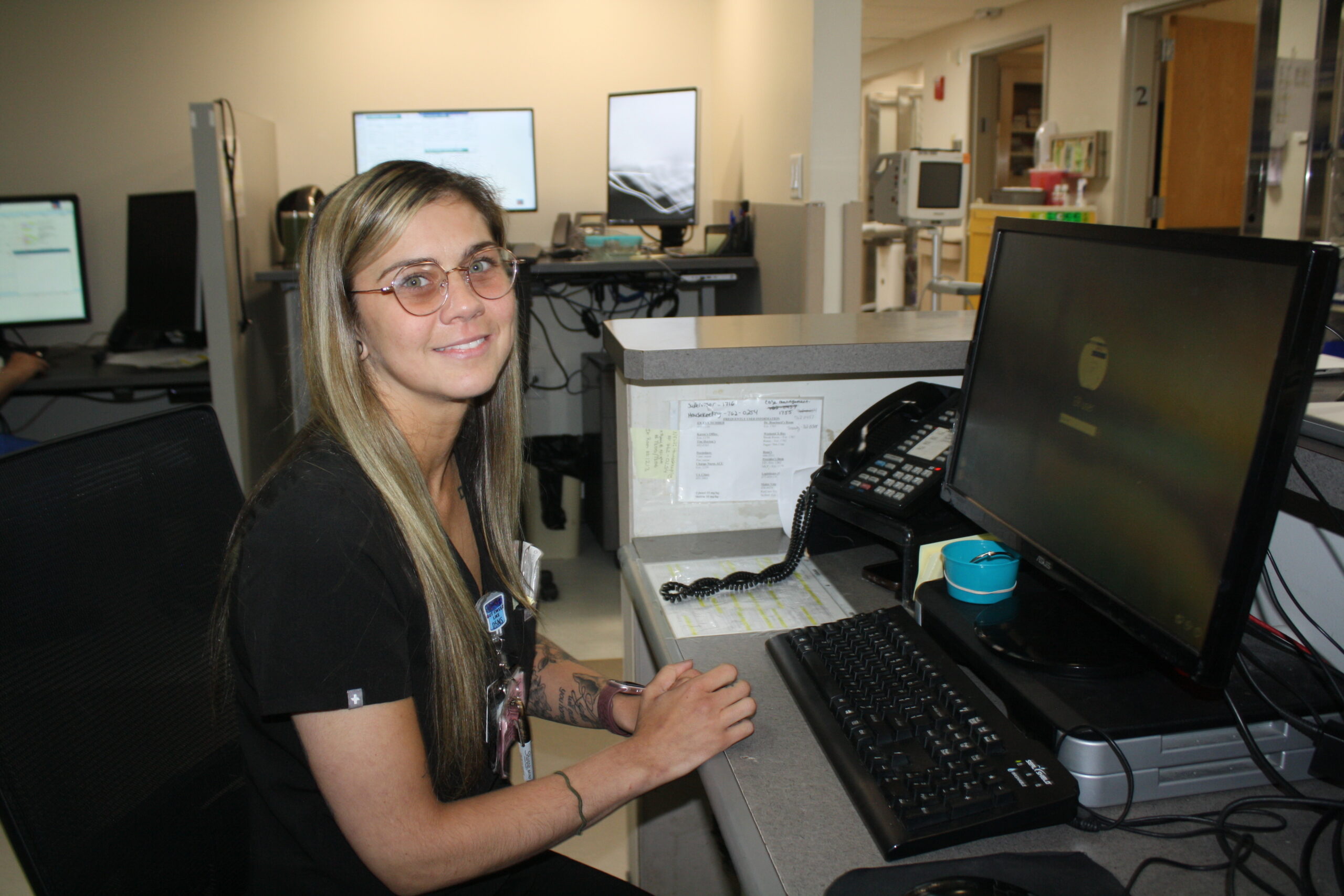
Amber Pratt, a registered nurse at Northern Light AR Gould Hospital in Presque Isle, was speaking with her supervisor one afternoon when a patient stormed into the office and shut the door.
The patient had a history of violence both inside and outside the facility, and had already destroyed hospital property during their stay, Pratt said.
At that moment, the patient blocked the only exit for Pratt and her supervisor, Jill Codrey, director of outpatient and inpatient nursing.
“We tried to remain calm and talk with the patient. They said things like ‘Are you going to press your [emergency alert] buttons,'” Pratt said.
AR Gould is one of 10 hospitals in the statewide Northern Light Health system that installed emergency alert buttons throughout each facility in 2022, which signal that security officers need to come immediately. It was one of several initiatives, including a stronger security officer presence and de-escalation training, aimed at preventing or mitigating violent incidents.
Pratt and Codrey were afraid to reach for the button, out of fear that their actions would escalate the patient’s distress. Luckily, security officers were already searching for the patient and found him after opening Codrey’s office door.
Hospitals in Maine’s larger cities have been dealing with such incidents for several years. The issue of patient violence is more recent in Aroostook County, but health care workers at AR Gould and hospitals across northern Maine are raising awareness that it has become part of doing their jobs, especially as mental health and substance use issues grow in the wake of the pandemic.

Violence against hospital workers has not been tracked statewide but is a growing and pervasive issue, said Sally Weiss, vice president of workforce policy and strategic initiatives at the Maine Hospital Association. Fifty percent of violent incidents in Maine hospitals occur in emergency departments, according to a national survey.
The Maine Hospital Association is leading efforts to study exactly how much the rate of patient-to-staff assaults has increased since before and during the onset of the pandemic, Weiss said, but current data is already concerning.
From 2012 to 2021, 69 percent of claims filed to the Maine Department of Labor across all industries for lost work time due to “intentional injury by another person” came from the health care sector.
Of those claims, 70 percent resulted from assaults by patients, according to a 2022 report from a state legislative task force, which studied whether Maine should enact criminal penalties against violent patients. Maine expanded its criminal code last year to include assaults against medical workers.
Between January 2019 and December 2023, the number of violent incidents committed against staff across the Northern Light System increased from an average of 35 per month to 72 incidents per month, said Kevin Reed, Northern Light Health’s director of security and support services administration.
AR Gould saw a 50-percent spike in violent incidents between January 2021 and December 2022, Reed said.
Pratt and Codrey have worked at AR Gould since 2011 and 2006, respectively, and said that increased patient violence during the pandemic worsened burnout among nurses.
“We have lost staff due to abuse and threats from patients. It’s demoralizing [for the nurses],” Codrey said. “I think the staff who stay do so because of why they went into healthcare: to care for people.”
In response, the hospital replaced its contracted security services with an in-house security force in 2021. AR Gould doubled its 24/7 security staff to 12 full-time officers and added a security manager.
Earlier this month, health care workers at Cary Medical Center in Caribou pinned buttons to their work clothing with the letters H-A-V on them. The letters stand for Hospitals Against Violence. Wearing the buttons symbolized the workers’ support for colleagues who have endured increased threats and violence from patients.
Cary nurses and security officials said they have seen how a shortage of mental health and substance use recovery centers in Maine affects patients in emergency rooms. Many should be in long-term behavioral health centers, but they stay in the emergency room longer than they should — sometimes days, weeks or months — and take out aggressions on staff.
“Virtually everyone in the emergency room has been verbally or physically abused,” said Mitch Wheeler, Cary’s security director. “I’ve seen nurses and security officers head butted, kicked, pinched, bitten. I’ve seen broken ribs and noses. And they have not missed one day of work.”
Not every patient with mental health or substance abuse issues becomes violent, Wheeler said. But those who do react negatively to being cooped up in an emergency room, making them more anxious and prone to aggressive behaviors.
To try to prevent such violence, Wheeler led Cary’s transition in 2020 from only two night-duty guards to 24/7 security, with two daily shifts and a total of four full-time guards, two part timers and several on-call guards.
Wheeler also launched de-escalation training for all Cary employees, which he said focuses on reducing a patient’s anxieties, giving verbal warnings against certain behaviors and recognizing non-verbal signs of potential violence, like raised fists. Physical restraint is always a last resort, and only enforced if a patient escalates to the point of violence, Wheeler said.
Having trained officers and nurses in the emergency room gives nurses like Alyssa Guimond, who has worked in Cary’s emergency room for over two years, a greater peace of mind.
“When I started, there were a lot more [incidents], but it has gotten better,” Guimond said. “[The officers] know what to do and sometimes notice things [about patients] that we don’t because we’re so busy.”
The changes at Cary were so successful that in 2022 Houlton Regional Hospital hired Wheeler as their security director, a position they now share with Cary. Under his leadership, the Houlton hospital implemented 24/7 coverage, increased the number of full-time officers to two during day and evening shifts and hired more on-call officers.
Those moves have led to cultural shifts at both hospitals, where nurses feel safer knowing that security officers are close by and ready to respond immediately.
“The nurses needed help. Now we’re there 24/7 and we’re stationed right outside the ER,” Wheeler said. “They know we have their backs.”
But in the long term, better security doesn’t address the underlying problem of violent patients. Guimond thinks that having more mental health facilities and providers in Aroostook would give many patients specialized treatment that emergency rooms often cannot fully provide.
In the meantime, Guimond said that, as a nurse, she remains motivated to give even the most troubled patients care and comfort.
“When they come to the ER, at least they’re getting some type of treatment and being seen and taken care of,” Guimond said.







